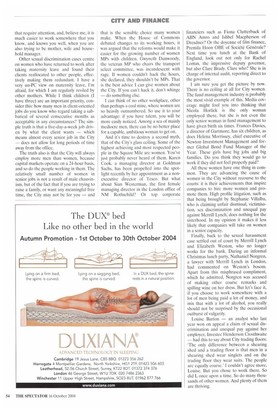Don't whinge if you can't hack it, girls
Heather McGregor says sex discrimination claims do nothing to advance the cause of the City's talented sisterhood At a recent Carlton political dinner — between Michael Howard's call to arms and Sir Christopher Gent's call for alms, as it were — I said hello to a senior financier seated at an adjacent table. I had only met him once before, but I thought it polite and politic to renew the acquaintance. The gentleman concerned greeted me and proceeded to remark on my décolletage, in somewhat vernacular terms.
At the age of 42 I am only too delighted to be capable of inspiring such a compliment, but it is worth mentioning that the phrase he used was almost word for word the same as the one which reportedly cost Merrill Lynch almost £1 million in a recent out-of-court settlement with Elizabeth Weston — one of a spate of headline-grabbing cases involving women in the City. Newspaper readers must think City women are incredibly hard done by: time after time they appear to have been unfairly or disgustingly treated by the misogynist sexual predators that employ them.
The most high-profile case was probably that of Julie Bower, an investment analyst who sued her former employer Schroder Salomon Smith Barney on the grounds that she had been paid less than her male colleagues and effectively forced out of her job; she eventually won £1.4 million in compensation. To the otitide world, Schroder's can't have sounded much fun to work for. In its defence, the firm argued that Ms Bower was 'aggressive, arrogant and unhinged'.
As someone who once had responsibility for more than 500 equity analysts, I can say that almost all of them, male or female, at one time or another, were capable of aggressive, arrogant or unhinged behaviour — and some all three. But let me banish the myth of sexual discrimination in the pay stakes. Women are not paid less than their male peers because they are women. Very few of them are paid less anyway. Perhaps more importantly, where City women do not top the earnings league tables, it is because they are simply not prepared to behave like men.
The City does not reward loyalty. If you want to be paid a lot, then you have to move around. By moving to a new employer you will usually secure a hefty sign-on bonus plus a guarantee of more to come. You may even be able to use an offer from another firm to win yourself a substantial rise to stay where you are. In the City, it is only people who scream and shout who get paid megabucks — but most women are just not like that. By nature they have a greater sense of loyalty to their employers. By the time they are relatively senior, they frequently also have domestic pressures that require attention, and, believe me, it is much easier to work somewhere that you know, and knows you well, when you are also trying to be mother, wife and household manager.
Other sexual discrimination cases centre on women who have returned to work after taking maternity leave and found their clients reallocated to other people, effectively making them redundant. I have a very un-PC view on maternity leave, I'm afraid, for which I am regularly reviled by other mothers. While I think children (I have three) are an important priority, consider this: how many men in client-oriented jobs do you know who regard taking a sabbatical of several consecutive months as acceptable in any circumstances? The simple truth is that a five-day-a-week job driven by what the client wants — which means almost every senior job in the City — does not allow for long periods of time away from the office.
The truth also is that the City will always employ more men than women, because capital markets operate on a 24-hour basis, and so do the people working in them. The relatively small number of women in senior jobs is not a result of male chauvinism, but of the fact that if you are trying to raise a family, or want any meaningful free time, the City may not be for you — and that is the sensible choice many women make. When the House of Commons debated changes to its working hours, it was argued that the reforms would make it easier for the growing number of women MPs with children. Gwyneth Dunwoody, the veteran MP who chairs the transport select committee, was incandescent with rage. If women couldn't hack the hours, she declared, they shouldn't be MPs. That is the best advice I can give women about the City. If you can't hack it, don't whinge — do something else.
I can think of no other workplace, other than perhaps a coal mine, where women are so heavily outnumbered. So use it to your advantage: if you have talent, you will be more easily noticed. Among a sea of mainly mediocre men, there can be no better place for a capable, ambitious woman to get on.
And it's time to destroy a second myth, that of the City's glass ceiling. Some of the highest achieving and most respected people in the Square Mile are women. You've just probably never heard of them. Karen Cook, a managing director at Goldman Sachs, has been propelled into the spotlight recently by her appointment as a nonexecutive director of Tesco. But what about Sian Westerman, the first female managing director in the London office of NM Rothschild? Or top corporate financiers such as Fiona Clutterbuck of ABN Amro and Ishbel Macpherson of Dresdner? Or the doyenne of film finance, Premila Hoon OBE of Societe Generale? Next time you lunch at the Bank of England, look out not only for Rachel Lomax, the impressive deputy governor, but also Clare Brady. Clare who? She is in charge of internal audit, reporting direct to the governor.
I am sure you get the picture by now. There is no ceiling at all for City women. The fund management industry is probably the most vivid example of this. Media coverage might fool you into thinking that Nicola Horlick is the only woman employed there, but she is not even the only senior woman in fund management to have given birth six times. Frances Davies, a director of Gartmore, has six children, as does Helena Morrissey, chief executive of Newton Investment Management and former Global Bond Fund Manager of the Year. These girls have big jobs and big families. Do you think they would go to work if they did not feel properly paid?
All these women have one thing in common. They are advancing the cause of women in the City without recourse to the courts: it is their achievements that inspire companies to hire more women and promote them. High profile litigation, such as that being brought by Stephanie Villalba, who is claiming unfair dismissal, victimisation, sex discrimination and unequal pay against Merrill Lynch, does nothing for the sisterhood. In my opinion it makes it less likely that companies will take on women in a senior capacity.
Finally, back to the sexual harassment case settled out of court by Merrill Lynch and Elizabeth Weston, who no longer works for the bank. During an informal Christmas lunch party, Nathaniel Norgren, a lawyer with Merrill Lynch in London, had commented on Weston's bosom. Apart from this misphrased compliment, which he admitted, Norgren was accused of making other coarse remarks and spilling wine on her dress. But let's face it, if you choose to work somewhere with a lot of men being paid a lot of money, and mix that with a lot of alcohol, you really should not be surprised by the occasional outburst of vulgarity.
Louise Barton — an analyst who last year won on appeal a claim of sexual discrimination and unequal pay against her employer, Investec Henderson Crosthwaite — had this to say about City trading floors: 'The only difference between a shearing shed and a trading floor is that men in a shearing shed wear singlets and on the trading floor they wear suits. The people arc equally coarse.' I couldn't agree more, Louise. But you chose to work there. So did 1, once upon a time. So do many thousands of other women. And plenty of them are thriving.











































































































 Previous page
Previous page